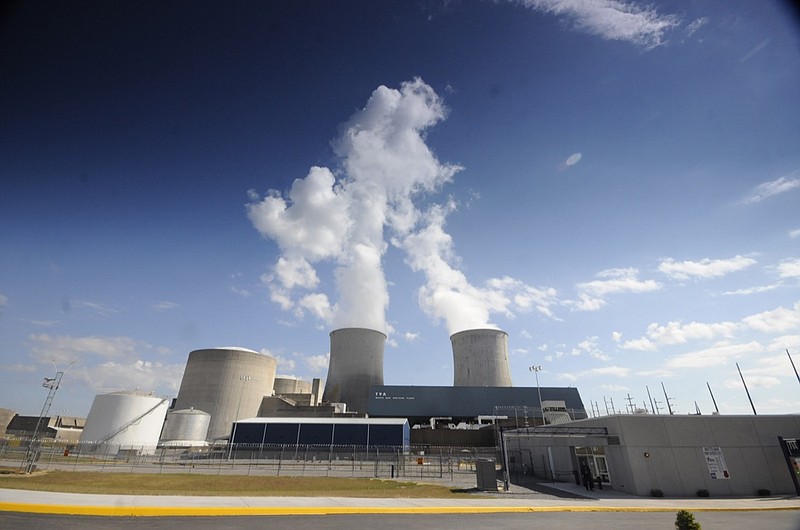For the second time in as many weeks, federal regulators have cited the Tennessee Valley Authority for violating nuclear safety standards in the past at one of its Tennessee nuclear power plants.
In a letter released Tuesday, the U.S. Nuclear Regulatory Commission accused TVA of providing inaccurate and insufficient information to regulators in November 2015 when pressurized water levels rose uncontrollably during the startup of the Unit 1 reactor at the Watts Bar Nuclear Plant near Spring City, Tennessee.
The NRC citation, which TVA has the right to challenge, identifies a dozen violations of NRC rules and could lead to another civil penalty against TVA. The NRC is also considering license suspensions or restrictions on some current and former TVA nuclear employees involved in the initial response to the problem and subsequent reports.
Kenneth G. O'Brien, director of the special project team assigned to study the incidents for the NRC Office of Enforcement, said TVA failed to maintain proper operating logs and failed to use proper procedures to resolve a pressurized water problem in the reactor's residual heat remover. After internal investigations by both TVA and the NRC, O'Brien cited "multiple examples in which TVA apparently maintained or submitted to the NRC incomplete or inaccurate information from December 2015 to March 2016."
"Based on the results of the investigation, 12 apparent violations were identified and are being considered for escalated enforcement action," O'Brien wrote in a letter to TVA.
TVA spokesman Jim Hopson said the NRC notification stems from events more the four years ago and said the incident "caused no immediate public safety concern and did not impact employee safety."
"TVA is fully committed to the safe operation of its nuclear units," Hopson said. "We'll ensure we have corrected all findings the NRC has noted."
The NRC finding of apparent violations comes just a week after the NRC also cited TVA for violating whistle blower protections for nuclear workers by disciplining and then firing nuclear engineers who raised questions about the leadership and processes at the Sequoyah and Watts Bar nuclear plants from 2015 to 2018. TVA continues to be under heightened regulatory oversight by the NRC for its "chilled work environment" for nuclear workers to voice their safety concerns.
Last November, the NRC also slapped a $145,000 fine on TVA for providing inaccurate information to the NRC regarding the licensing and startup work at the Unit 2 reactor at Watts Bar.
NRC spokesman Roger Hannah said the civil penalty last November and the apparent violations issued this month are all separate instances. But with three NRC enforcement actions against TVA in just four months - plus the ongoing "chilled work environment" assessment of the utility's nuclear program - TVA is currently facing the most amount of NRC enforcement actions of any U.S. utility.
TVA has the right to challenge both of the new NRC citations issued this month with either written responses or a contested hearing.
Last week, TVA Nuclear Chief Timothy Rausch said TVA disagrees with NRC's findings about improper retaliation against its nuclear engineers and said nuclear safety remains the highest priority for the federal utility.
Despite the NRC findings of apparent violations this month and the fine paid by TVA last fall, Rausch said "indications through recent independent evaluations are that our safety culture has improved at all three stations (Sequoyah, Watts Bar and Browns Ferry) and in our corporate office."
Since he was named head of TVA's nuclear power program in October 2018, Rausch said he has worked to improve TVA's safety culture and performance.
Hopson said the past problem cited by the NRC at Watts Bar and how it was handled in 2015 and 2016 "is not indicative of our current performance or culture."
"Watts Bar is a different site with a different leadership team and with improved performance," he said.
Indeed, the NRC's new annual assessment of the Watts Bar plant issued last week rates TVA's operation of the plant in the highest performance category "because all inspection finding had very low safety significance."
But Mark Miller, director of the NRC's division of reactor projects, said regulators are "still deliberating on the appropriate time to close the Watts Bar Chilling Effect Letter" regarding how employee safety concerns are handled and the NRC's heightened oversight of such concerns will remain in place, at least for now.
David Lochbaum, a former NRC and TVA nuclear engineer who was formerly the director of the Nuclear Safety Project for the Union of Concerned Scientists, said the latest incidents identified by the NRC last week "are but the latest in a long-standing practice of TVA violating federal regulations by retaliating against nuclear workers raising safety concerns" under different executives and nuclear managers.
"Despite this management musical chairs, TVA has managed to sustain its practice of illegally retaliating against nuclear workers," Lochbaum said after reviewing the latest retaliation findings against TVA's nuclear engineers. "Curious that an organization created and tasked with flood control is unwilling or unable to stem a flood of whistle blower infractions."
Contact Dave Flessner at dflessner@timesfreepress.com or at 757-6340
